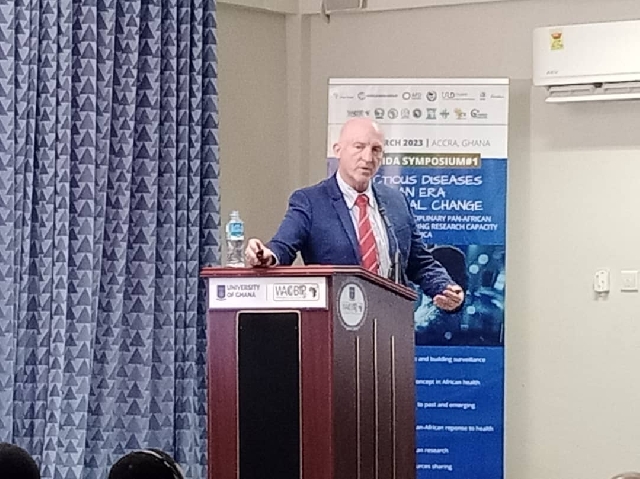WANIDA pushes for new vaccines for the treatment of Malaria
 Dr Patrick Duffy, WANIDA
Dr Patrick Duffy, WANIDA
The West African Network of Infectious Diseases ACE (WANIDA) in partnership with the University of Ghana’s (UG) West African Centre for Cell Biology of Infectious Pathogens (WACCBIP) has announced Africa’s readiness for the development of new vaccines for the treatment of Malaria on the continent.
The maiden WANIDA symposium held in Accra, Ghana, seeks to address a challenge in Africa on the theme: “Infectious Diseases in an Era of Global Change: Innovative Multidisciplinary Pan-African Efforts Towards Building Capacity in Africa.”
Thematic areas for the meeting held at the WACCBIP conference room on the UG campus on Wednesday, March 8, 2023, focused on surveillance and preparedness for new pandemics, Pathogenic basis of diseases and host responses, innovative disease prevention strategies and vaccinology, neglected tropical diseases and strategies for malarial control and elimination.
The meeting was also to strengthen Pan-African networks of scientific excellence.
Speaking at the meeting, Dr Patrick Duffy, Chief of the Laboratory of Malaria Immunology and Vaccinology said the team has researched developing malaria vaccines to protect children and pregnant women.
According to him, Africa has the expertise to do so.
He said Ghana has played a key role in ensuring vaccine development on the continent with the introduction of the OTSS vaccine for clinical malaria in children which is the first one to be approved by the World Health Organization (WHO).
“This has been widely used in Ghana and has been approved for Malaria treatment in children.
“Ghana is the first of three countries in Africa that has a vaccine approved for the treatment of Malaria,” the Chief of the Vaccine Development Unit revealed.
He added that the other aspects of effective vaccines for Malaria in pregnant women are also being worked on with the R21.
Dr Duffy who is also the Chief of the Pathogenesis and Immunity Section, National Institute of Health (NIH), Bethesda, called for the development of research into the vaccine to protect sensitive organs of the body.
“There is a need for vaccine development for the treatment of Malaria because of Africa’s growing community. People who are affected by Malaria in Africa are the poorest,” he added.
For his part, Prof Nicaise Ndam, a partner at WANDIAN, Nigeria, noted that Malaria is one of the leading killer diseases in Africa.
According to him, vaccine development is very important and the question is being addressed by scientists to protect vital organs in the body.
There is a growing community of researchers seeking to develop a vaccine for the treatment of Malaria on the continent.
“Here in Ghana, the facilities such as Noguchi Memorial Institute, WACCBIP, among others are there,” he said.
Source: Classfmonline.com/cecil Mensah
Trending News

MP commends University of Energy and Natural Resources debating team
02:59
Dzata Foundation hosts youth mental health engagement to mark World Mental Health Day 2025
09:00
Interior Minister warns against attacks on security personnel as Eastern Regional Security Command is inaugurated
15:48
Ashanti Regional MPs react to allegations of opting for community roads instead of flyovers
14:38
GA/R: Tension in Weija-Gbawe as MCE enforces sanitation laws after clean-up exercise
13:51
Anglican Diocese of Koforidua honours former President Akufo-Addo with Lay Canon appointment
02:50
Ministry of Defence holds quarter guard ceremony to promote military discipline and ethics
08:40
C/R: Body of 90-year-old man found decomposed at Kasoa-Zongo home
17:31
NPP declines PURC's invitation on proposed utility tariffs increment
14:29
Anyinam bypass on Accra-Kumasi road closed down temporarily
13:41



